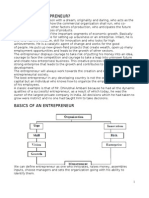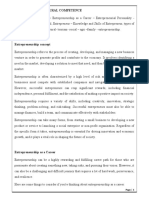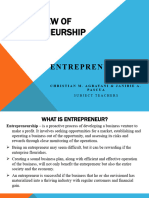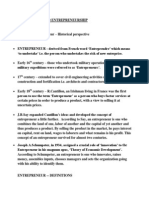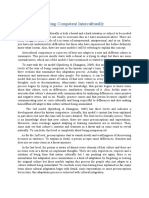Lecture: Characteristics and Functions of An Entrepreneur
Lecture: Characteristics and Functions of An Entrepreneur
Uploaded by
6fxsy6824hCopyright:
Available Formats
Lecture: Characteristics and Functions of An Entrepreneur
Lecture: Characteristics and Functions of An Entrepreneur
Uploaded by
6fxsy6824hOriginal Title
Copyright
Available Formats
Share this document
Did you find this document useful?
Is this content inappropriate?
Copyright:
Available Formats
Lecture: Characteristics and Functions of An Entrepreneur
Lecture: Characteristics and Functions of An Entrepreneur
Uploaded by
6fxsy6824hCopyright:
Available Formats
Lecture: Characteristics and Functions of an Entrepreneur
Several factors go into the making of an entrepreneur. Individuals who initiate, establish,
maintain and expand new enterprises constitute the entrepreneurial class. The social-political and
economic conditions, the availability of industrial technology and know-how, state of art and culture
of business and trading, existence of markets for products and services and the incentives and
facilities available for starting an industry or business, all have a bearing on the growth of
entrepreneurship. A conducive environment is created through the policies and interest of the
government in economic and industrial development.
• Characteristics of an entrepreneur:
Entrepreneur is a key figure in economic progress. He is the person who introduces new
things in the economy. He is considered as the business leader and not as simple owner of capital.
He is a person with telescopic faculty, drive and talent who perceives business opportunities and
promptly seizes them for exploitation. To be successful, an entrepreneur should have the following
characteristic features.
1. Need for achievement: Entrepreneurs have got strong desire to achieve higher goals. Their inner
self motivates their behaviour towards high achievement: most of the people dream of success but
do not take any action towards achieving these dreams. Entrepreneurs with high n-Ach factor act
continuously to achieve the goal and make their dreams come true. For them, winning is
achievement.
2. Independence: Most of the entrepreneurs start on their own because they dislike to work for
others. They prefer to be their own boss and want to be responsible for their own decisions.
3. Risk-taker: Entrepreneurs are the persons who take decisions under uncertainty and thus they are
willing to take risk, but they never gamble with the results. They choose moderate risk rather than
play wild gamble. They, therefore, undertake calculated risk which is high enough to be exciting,
but with a fairly reasonable chance to win.
4. Locus of control: According to Rotter’s locus of control theory, an individual perceives the
outcome of an event as being either within or beyond his personal control. Entrepreneurs believe in
their own ability to control the consequences of their endeavour by influencing their socio- economic
environment rather than leave everything to luck.
5. Perseverance: Entrepreneur has got the quality of sticking to job he decides to undertake. Once
committed to a specific goal and course of action, entrepreneurs become absorbed to it. They
personally solve the problems that come across their way while setting up the project. They also
work sincerely until the whole project is successfully implemented.
Entrepreneurship Development & Business Communication (ENP2061) SoAS, GDGU
Dr. Anwesha Mandal, Asst. Professor
Lecture: Characteristics and Functions of an Entrepreneur
6. Positive self-concept: Entrepreneurs are always positive in their action. Being an achiever, he
directs his fantasies and dreams towards achievement of worthwhile goals and sets extraordinary
standard of excellence in what he is doing. This is based upon his awareness of SWOT analysis, i.e.
his strengths, weaknesses, opportunities and threats. He utilizes his positive knowledge to support
his thinking. He never exhibits any negative attitude.
7. Ability to find and explore opportunities: Entrepreneurs are always alert to opportunities. They
are very much quick to see and grab opportunities. They exhibit an innovative turn of mind and
convert the problems into viable opportunities. They plan intellectually and anticipate carefully how
to achieve their goals in realizing an opportunity.
8. Hope of success: Hope of success is a significant quality of entrepreneurial personality.
Entrepreneurs set their goals with a hope of success rather than fear of failure. This is because they
set their goals on the basis of facts and their ability to maneuver them to their advantage.
9. Flexibility: Most of the successful entrepreneurs measure the pros and cons of a decision and
tend to change if the situation demands. They never feel reluctant to revise their decisions. They are
the persons with open mind without rigidity.
10. Analytical ability of mind: Entrepreneurs are unaffected by personal likes and dislikes. They
stand beyond these types of prejudices as they are realistic in their approach. At the time of their
need they select experts rather than friends and relatives to assist them. They usually avoid emotional
and sensitive attitude towards their business or problem.
11. Sense of efficacy: Entrepreneurs are always oriented towards action for accomplishment of their
goals. Being confident of their abilities, they find themselves as problem solvers rather than problem
avoiders. They chalk out their goals for future and make planning to achieve them.
12. Openness to feedback and learning from experience: Successful entrepreneurs like to have
immediate feedback of their performance. They modify their plans on the basis of the feedback they
receive from the environment around them. They learn from their experience and never get
discouraged having received unfavorable information. On the contrary, they are stimulated by
unfavorable information to involve themselves sincerely in their own tasks to reach their desired
goals.
13. Confronting uncertainty: Successful entrepreneurs are always optimistic and take every odd
as the opportunity. They maneuver their environment in such a way that the works get accomplished
rationally. Thus, they win by the application of their extraordinary insight and skill.
Entrepreneurship Development & Business Communication (ENP2061) SoAS, GDGU
Dr. Anwesha Mandal, Asst. Professor
Lecture: Characteristics and Functions of an Entrepreneur
14. Interpersonal skills: Entrepreneurs are always comfortable while dealing with people at all
levels. They interact with raw material suppliers, customers, bankers, etc. for different activities. As
successful entrepreneurs, they should be persons who like working with others possessing the much
needed quality of interpersonal skill to deal with people.
15. Need to influence others: Once the entrepreneurs set their goals, they have to play the roles of
manager too. For influencing others (n Power), a low need to establish emotional relationship (low
n-Affiliation), and a high need to discipline one’s own self (to inhibit over expression of their
personality) are essential.
16. Stress takers: Entrepreneurs are capable of working for long hours and solving different
complexities at the same time. As the captain of an industry or an enterprise, an entrepreneur faces
a number of problems and in right moment he takes right decisions which may involve physical as
well as mental stress. He can face these challenges if he has the capability to work for long hours
and keep himself cool under monotony.
17. Time orientation: Entrepreneurs anticipate future trends basing upon their past experience and
exposure. They stick to the time pragmatically while doing their jobs.
18. Innovators: Successful entrepreneurs are innovators. They constantly put their efforts in
introducing new products, new method of production, opening new markets and recognizing the
enterprise.
19. Business communication skill: In order to motivate others in the business entrepreneurs must
possess good communication skill. Both written and oral communication skills are necessary for the
entrepreneurs for running enterprise efficiently.
20. Telescopic faculty: Successful entrepreneurs always tend to think ahead. They have got
telescopic faculties which make them think for the future. Future orientation makes them quite alert
to the changing conditions of the time and they tend to produce goods and commodities as per the
changing demands.
21. Leadership: Entrepreneurs should possess the quality of leadership. Leadership is the ability to
exert interpersonal influence by means of communication towards the achievement of goals.
Entrepreneurs as the leaders should provide the necessary spark to motivation by guiding, inspiring,
assisting and directing the members of the group for achievement of unity of action, efforts and
purpose. Hence, entrepreneurs by their own leadership styles and behaviour reduce the problems by
proper handling of situations. Good administrative work depends upon effective leadership of the
entrepreneur.
Entrepreneurship Development & Business Communication (ENP2061) SoAS, GDGU
Dr. Anwesha Mandal, Asst. Professor
Lecture: Characteristics and Functions of an Entrepreneur
22. Business planning: Planning implies deciding in advance what, when and how to do a thing.
Entrepreneurs should be equipped with skill and knowledge to prepare their business plan. A
successful entrepreneur always follows the principles of management while planning for his
business. The planning can act as a bridge between the present positions and expected future shape
of the enterprise. It provides a sense of vision to the entrepreneurs to cope with risky and uncertain
situation.
23. Decision making: Decision-making skill is a fundamental characteristic of an entrepreneur.
This implies the function of choosing a particular course of action at every stage of creation of an
enterprise out of several alternative courses for the purpose of achieving specified goals. Hence,
decision making is necessary at all times and mostly at conditions of uncertainty and risk.
24. Ability to mobilize resources: Entrepreneurs must have the ability to marshal all the inputs to
obtain the end product. They have to mobilize 6Ms, i.e. Man, Money, Material, Machinery, Market
and Method effectively to realize the final product as entrepreneurship is a function of gap filling
and input completing.
25. Self-confidence: Entrepreneurs must have self-confidence to accomplish the task effectively
and efficiently. They must take decisions on their own in uncertain and risky situation and should
stick to it confidently even if there occur initial setbacks.
• Functions of entrepreneurs:
An entrepreneur is an opportunity seeker. He is also the organizer and coordinator of the agents
of production. He has to execute many a good functions while establishing a small scale enterprise.
He not only perceives the business opportunities but also mobilizes the other resources like 5Ms-
man, money, machine, materials and methods. However, the main functions of the entrepreneurs are
discussed further.
1. Idea generation: This is the most important function of the entrepreneur. Idea generation can be
possible through the vision, insight, observation, experience, education, training and exposure of the
entrepreneur. Idea generation precisely implies product selection and project identification. Ideas
can be generated through environmental scanning and market survey. It is the function of the
entrepreneurs to generate as many ideas as he can for the purpose of selecting the best business
opportunities which can subsequently be taken up by him as a commercially-viable business venture.
2. Determination of objectives: The next function of the entrepreneur is to determine and lay down
the objectives of the business, which should be spelt out on clear terms. In other words, entrepreneur
should be very much clear about the following things:
Entrepreneurship Development & Business Communication (ENP2061) SoAS, GDGU
Dr. Anwesha Mandal, Asst. Professor
Lecture: Characteristics and Functions of an Entrepreneur
(i) The nature of business
(ii)The type of business
This implies whether the enterprise belongs to the category of a manufacturing concern or a
service-oriented unit or a trading business, so that the entrepreneurs can very well carry on the
venture in accordance with the objectives determined by him.
3. Raising of funds: Fund raising is the most important function of an entrepreneur. All the activities
of a business depend upon the finance and its proper management. It is the responsibility of the
entrepreneur to raise funds internally as well as externally. In this matter, he should be aware of the
different sources of funds and the formalities to raise funds. He should have the full knowledge of
different government sponsored schemes such as PMRY, SGSY, REGP, etc. by which he can get
Government assistance in the form of seed capital, fixed and working capital for his business.
4. Procurement of raw materials: Another important function of the entrepreneur is to procure
raw materials. Entrepreneur has to identify the cheap and regular sources of supply of raw materials,
which will help him to reduce the cost of production and face the competition boldly.
5. Procurement of machinery: The next function of the entrepreneurs is to procure the machineries
and equipments for establishment of the venture. While procuring the machineries, he should specify
the following details:
(a) The details of technology
(b) Installed capacity of the machines
(c) Names of the manufacturers and suppliers
(d) Whether the machines are indigenously made or foreign made
(e) After-sales service facilities
(f) Warranty period of the machineries
All these details are to be minutely observed by the entrepreneurs.
6. Market research: The next important function of the entrepreneur is market research and product
analysis. Market research is the systematic collection of data regarding the product which the
entrepreneur wants to manufacture. Entrepreneur has to undertake market research persistently in
order to know the details of the intending product, i.e. the demand for the product, the supply of the
product, the price of the product, the size of the customers, etc. while starting an enterprise.
Entrepreneurship Development & Business Communication (ENP2061) SoAS, GDGU
Dr. Anwesha Mandal, Asst. Professor
Lecture: Characteristics and Functions of an Entrepreneur
7. Determination of form of enterprise: The function of an entrepreneur in determining the form
of enterprise is also important. Entrepreneur has to decide the form of enterprise based upon the
nature of the product, volume of investment, nature of activities, types of product, quality of product,
quality of human resources, etc. The chief forms of ownership organizations are sole proprietorship,
partnership, Joint Stock Company and cooperative society. Determination of ownership right is
essential on the part of the entrepreneur to acquire legal title to assets.
8. Recruitment of manpower: Entrepreneur has to perform the following activities while
undertaking this function:
(a) Estimating manpower need of the organization
(b) Laying down of selection procedure
(c) Devising scheme of compensation
(d) Laying down the rules of training and development
9. Implementation of the project: Entrepreneur has to work on the implementation schedule or the
action plan of the project. The identified project is to be implemented in a time-bound manner. All
the activities from the conception stage to the commissioning stage are to be accomplished by him
in accordance with the implementation schedule to avoid cost and time overrun, as well as
competition. Thus, implementation of the project is an important function of the entrepreneur.
Entrepreneurship Development & Business Communication (ENP2061) SoAS, GDGU
Dr. Anwesha Mandal, Asst. Professor
You might also like
- Who Is An EntrepreneurDocument7 pagesWho Is An Entrepreneurrahulravi4uNo ratings yet
- 7.2 Discussion Essay Esl PrintablesDocument2 pages7.2 Discussion Essay Esl PrintablesGemma86% (7)
- Entrepreneurship Development NotesDocument15 pagesEntrepreneurship Development NotesKapilNo ratings yet
- Entrepreneur DevelopmentDocument16 pagesEntrepreneur DevelopmentRADHA JAYALAKSHMI TNo ratings yet
- ENTREPRENEURship Notes Mba 2nd SemDocument130 pagesENTREPRENEURship Notes Mba 2nd SemKajal NainNo ratings yet
- Strategic Entrepreneurship and Startup ManagementDocument139 pagesStrategic Entrepreneurship and Startup ManagementPreethi JohnNo ratings yet
- Personal Entrepreneurial Competencies PECsDocument5 pagesPersonal Entrepreneurial Competencies PECsJamaica May DiazNo ratings yet
- Unit 1Document15 pagesUnit 1trustme77No ratings yet
- EDP-1st UNIT PDF - 093857Document10 pagesEDP-1st UNIT PDF - 093857Abhishek kumarNo ratings yet
- Entrepreneurship DevelopmentDocument19 pagesEntrepreneurship DevelopmentRohit NegiNo ratings yet
- Entrepreneur: - Webster's - Someone Who Runs A Business at - An Entrepreneur Is A Person Who UndertakesDocument5 pagesEntrepreneur: - Webster's - Someone Who Runs A Business at - An Entrepreneur Is A Person Who UndertakesniyatichaudharyNo ratings yet
- Entrepreneur Task 3Document9 pagesEntrepreneur Task 3Mohammad AnisuzzamanNo ratings yet
- Learning Material (Topic 2) Entrepreneurial BehaviorDocument19 pagesLearning Material (Topic 2) Entrepreneurial BehaviorCharlote Jennifer FetalinoNo ratings yet
- Qualities of A Successful EntrepreneurDocument9 pagesQualities of A Successful Entrepreneurbhumika01No ratings yet
- Enterprenuership Notes.Document60 pagesEnterprenuership Notes.mike mutemi100% (1)
- ED unit 1Document13 pagesED unit 1RahulNo ratings yet
- Module 1Document87 pagesModule 1jezil3308No ratings yet
- Mscitm Iv BM010Document15 pagesMscitm Iv BM010RaseekNo ratings yet
- UNIT 1 EntrepreneurshipDocument18 pagesUNIT 1 Entrepreneurshipnadia100% (1)
- 1.1. Entrepreneur: 1.1.1. Meaning and Definition of EntrepreneurDocument10 pages1.1. Entrepreneur: 1.1.1. Meaning and Definition of Entrepreneurazam49No ratings yet
- Chapter 3Document21 pagesChapter 3John NasasiraNo ratings yet
- PecsDocument17 pagesPecsFlorante FerrerNo ratings yet
- 1.1 Evolution of The ConceptDocument3 pages1.1 Evolution of The Conceptzandub090No ratings yet
- Unit I Entrepreneural Competence Entrepreneurship DevelopmentDocument8 pagesUnit I Entrepreneural Competence Entrepreneurship DevelopmentMARIDAYYA NAIDU BODAPATHRUNINo ratings yet
- Enterpreneurship DevelopmentDocument25 pagesEnterpreneurship DevelopmentRifat QaziNo ratings yet
- Key Concepts and Common Competencies: Lesson 2Document40 pagesKey Concepts and Common Competencies: Lesson 2Loren Cruz100% (1)
- Gst 223 Complete MaterialDocument34 pagesGst 223 Complete Materialabdulhakimnuruddeen17No ratings yet
- ED - Reference Material - SIMSDocument35 pagesED - Reference Material - SIMSshubhi sharmaNo ratings yet
- Entrepreneurship Development Communication Skill Seven Sem NoteDocument98 pagesEntrepreneurship Development Communication Skill Seven Sem Notesijan bistaNo ratings yet
- Chapter 1 EntrepreneurshipDocument7 pagesChapter 1 EntrepreneurshipDominic SilvestreNo ratings yet
- Unit 1 EntrepreneurshipDocument16 pagesUnit 1 Entrepreneurshipar.vasanthkNo ratings yet
- EntrepreneurshipDocument4 pagesEntrepreneurshipaljoysupapoNo ratings yet
- Hand-Out 1-Entrepreneurship ConceptsDocument9 pagesHand-Out 1-Entrepreneurship ConceptsGasper ShirimaNo ratings yet
- 2-Introduction To EntrepreneurshipDocument20 pages2-Introduction To EntrepreneurshipHanna RuthNo ratings yet
- Entrep Lecture 4Document13 pagesEntrep Lecture 4damostephanie124No ratings yet
- notes unit-1,2Document21 pagesnotes unit-1,2maryjan88No ratings yet
- EntrepreneurshipDocument57 pagesEntrepreneurshipVivekNo ratings yet
- Entrepreneur QualitiesDocument16 pagesEntrepreneur QualitieshvrkNo ratings yet
- Entrep Q1 Week 1 2Document33 pagesEntrep Q1 Week 1 2Mark Junnel PascuaNo ratings yet
- Module 1 IMPDocument17 pagesModule 1 IMPNilesh BadhiyaNo ratings yet
- Shubh JewellersDocument95 pagesShubh JewellersAkhilesh JainNo ratings yet
- Ravneet DCM1205Document11 pagesRavneet DCM1205Pankaj Kumar - 222No ratings yet
- Entrepreneurial and Managerial CharacteristicsDocument11 pagesEntrepreneurial and Managerial CharacteristicsKritika ThakurNo ratings yet
- Entrepreneur Entrepreneur Entrepreneur Entrepreneur EntrepreneurDocument15 pagesEntrepreneur Entrepreneur Entrepreneur Entrepreneur Entrepreneurk2hgmfmnhxNo ratings yet
- Entrepreneurship Chapter OneDocument10 pagesEntrepreneurship Chapter OnechuchuNo ratings yet
- Entrepreneurial CompetenciesDocument5 pagesEntrepreneurial Competencieskhushibisht971No ratings yet
- Lesson 1 - Personal Entrepreneurial CompetenciesDocument2 pagesLesson 1 - Personal Entrepreneurial Competenciessuzanne matuba100% (1)
- Week1 EntrepDocument17 pagesWeek1 EntrepCherayz LopezNo ratings yet
- Qualities of Good EntrepreneurDocument20 pagesQualities of Good EntrepreneurDivya KrishnakumarNo ratings yet
- B.tech 4th Year Unit-1 EntrepreneurshipDocument12 pagesB.tech 4th Year Unit-1 EntrepreneurshipHarmeet KaurNo ratings yet
- Management SB - L1Document14 pagesManagement SB - L1Nouran MohamedNo ratings yet
- Entrepreneurship Unit-1Document17 pagesEntrepreneurship Unit-1shikhaNo ratings yet
- Entrepreneurship Development: Unit - 1: Entrepreneurship Concept-Entrepreneurship As A Career - Entrepreneur-PersonalityDocument118 pagesEntrepreneurship Development: Unit - 1: Entrepreneurship Concept-Entrepreneurship As A Career - Entrepreneur-PersonalityjeebalaNo ratings yet
- 002 Pecs Skills 10Document18 pages002 Pecs Skills 10jonazgellidon0No ratings yet
- Q1-W1Document30 pagesQ1-W1annieeriyangiis.00No ratings yet
- Online PPT Entrepreneurship UNIT 2Document38 pagesOnline PPT Entrepreneurship UNIT 2sagar bamerNo ratings yet
- Entrepreneurial MindsetDocument23 pagesEntrepreneurial Mindsethixel50400No ratings yet
- Concept of EntrepreneurshipDocument42 pagesConcept of EntrepreneurshipMaestro Odamitsal100% (2)
- Chapter One EnterpreneurshipDocument20 pagesChapter One EnterpreneurshipSomanath BilihalNo ratings yet
- Entrepreneurship Chapter OneDocument10 pagesEntrepreneurship Chapter OneterefeNo ratings yet
- Blueprint for Serial EntrepreneurshipFrom EverandBlueprint for Serial EntrepreneurshipRating: 5 out of 5 stars5/5 (1)
- Full download Handbook of Cognition 1st Edition Dr Koen Lamberts pdf docxDocument60 pagesFull download Handbook of Cognition 1st Edition Dr Koen Lamberts pdf docxrigalunrauvo100% (7)
- Behavioural FinanceDocument4 pagesBehavioural FinanceGeetika RajputNo ratings yet
- Architecture and Disjunction Essay - 0806092 PDFDocument2 pagesArchitecture and Disjunction Essay - 0806092 PDFhusnaabharinaNo ratings yet
- Reflection Paper - Fle285 - Yusuf AksuDocument4 pagesReflection Paper - Fle285 - Yusuf Aksuapi-644093442No ratings yet
- Kuiz Final Eppm 3033 (2021)Document10 pagesKuiz Final Eppm 3033 (2021)Nik FatihahNo ratings yet
- (the Effective Teacher's Guides) Michael Farrell - Supporting Disorders of Learning and Co-Ordination _ Effective Provision for Dyslexia, Dysgraphia, Dyscalculia and Dyspraxia-Center Street (2022)Document117 pages(the Effective Teacher's Guides) Michael Farrell - Supporting Disorders of Learning and Co-Ordination _ Effective Provision for Dyslexia, Dysgraphia, Dyscalculia and Dyspraxia-Center Street (2022)5785586558No ratings yet
- Note TakingDocument34 pagesNote TakingAnonymous LyxcVoNo ratings yet
- Module 3 Q1 Strategic HRMDocument11 pagesModule 3 Q1 Strategic HRMKrupa BhadaniNo ratings yet
- Ever Since My Dad Tried To Convince Me To Meditate When I Was About 12Document2 pagesEver Since My Dad Tried To Convince Me To Meditate When I Was About 12Mr Ravi SivaprakashNo ratings yet
- Smart Classroom An Innovation in Teaching Learning ProcessDocument6 pagesSmart Classroom An Innovation in Teaching Learning ProcessAnonymous CwJeBCAXpNo ratings yet
- SyllabusDocument14 pagesSyllabusswdaNo ratings yet
- ctl2011 4235 Wky201 PDFDocument22 pagesctl2011 4235 Wky201 PDFmaka durglishviliNo ratings yet
- Population Research Convenience Sampling StrategiesDocument2 pagesPopulation Research Convenience Sampling StrategiesGabriel AgyemangNo ratings yet
- Reflection On My STPDocument2 pagesReflection On My STPapi-541094466No ratings yet
- Facilitating Learning Conditions of LearningDocument18 pagesFacilitating Learning Conditions of Learningjade tagabNo ratings yet
- 10.2307@20055348Document20 pages10.2307@20055348Nancy Al-Assaf, PhDNo ratings yet
- Unit 4 Leisure ActivitiesDocument12 pagesUnit 4 Leisure ActivitiesTran PhuongNo ratings yet
- Bengaluru University ProjectDocument2 pagesBengaluru University ProjectSagarNo ratings yet
- Step by Step Guide To Value Selling 20180919 PDFDocument27 pagesStep by Step Guide To Value Selling 20180919 PDFabhieek100% (1)
- Week 2 - Homeroom GuidanceDocument5 pagesWeek 2 - Homeroom Guidancedo san nam100% (1)
- Address: Salaza, Palauig, Zambales Contact No.: 0905 446 9364 / 0917 6349 840 Email Address: 301027@deped - Gov.phDocument2 pagesAddress: Salaza, Palauig, Zambales Contact No.: 0905 446 9364 / 0917 6349 840 Email Address: 301027@deped - Gov.phAmy Ajoste NacinNo ratings yet
- Top 10 Tips For Passing Medical Exams V2.0Document15 pagesTop 10 Tips For Passing Medical Exams V2.0shaikhmuzuNo ratings yet
- Training Design: Welingkar's Distance Learning DivisionDocument62 pagesTraining Design: Welingkar's Distance Learning Divisionsubin_mampallyNo ratings yet
- Psychological DisordersDocument48 pagesPsychological Disordersapi-448144386100% (1)
- The Cambridge Handbook of Instructional Feedback: Published Online by Cambridge University PressDocument650 pagesThe Cambridge Handbook of Instructional Feedback: Published Online by Cambridge University Pressgauravvarma160404No ratings yet
- Chapter 5Document36 pagesChapter 5Munkhchimeg AltankhuyagNo ratings yet
- Understanding Student BehaviorDocument59 pagesUnderstanding Student BehaviorshalomNo ratings yet
- Week 007-008-Module Symbolic PsychoanalysisDocument7 pagesWeek 007-008-Module Symbolic PsychoanalysisAlmirah MakalunasNo ratings yet
- Kluskiewicz Michelle Reflective Essay 4Document3 pagesKluskiewicz Michelle Reflective Essay 4api-354980593No ratings yet
